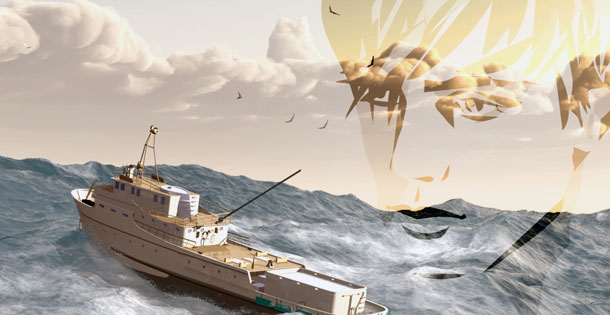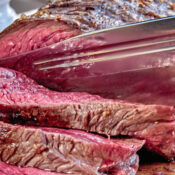It’s still dark when Mom wakes me, the sky outside my window black with the new moon. I sit up in bed, feeling the gravitational pull of the incoming tide as it floods the shallow sand flats just down the road, inundating my body, lifting the bow of my nose, and gently rolling out from beneath my heels as I brush my teeth, pull a T-shirt over my head, slather sunscreen on my neck and arms.
In the kitchen, Mom hands me a piece of peanut-butter toast. She’s made coffee even though Dad was the only one who drank it. Since he’s been gone, I’ve been trying to like it. I pour some into a mug and top it off with milk and sugar. It’s not bad like this. I think Mom just likes the smell of it in the kitchen. Reminds her of Dad.
“High tide’s at 9:15 this morning,” Mom says, turning the volume down on the marine radio in her hand. This is how she used to communicate with Dad when he was miles offshore with his clients, fishing. He died three months ago. Lung cancer. Mom still listens to the guides chattering about the weather, about who’s catching what. Sometimes she’ll say their names, laugh, and shake her head. “There’s Crusty Rusty,” she’ll say, talking about the cantankerous old guide who berates his clients when they lose a fish. Or, “There’s Four-and-a-Half Frank,” the captain who lost part of his first finger to a bull shark. All the captains have scars of some sort. My dad had puncture marks all over his arms and neck from his clients hooking him. It’s part of being a fisherman.
Once, I caught Mom with the radio in her hand and tears streaming down her cheeks, and I knew they must have mentioned Dad’s name, or maybe the name of the captain who bought his old boat. Or maybe she was thinking of the bank note she’d just paid off and the fact that there wasn’t much left. Dad had no life insurance. Now, watching me eat, her face is stoic and sober, like the morning. “Water should be moving pretty good right now,” she says.
“The bite’s on,” I say, gulping my coffee, choking down the thick toast.
“Think Flip will let you go out with him today?”
“He said if he has a full-day charter he might have room for me.”
“You be careful out there,” Mom says, patting my hand. “I know you’re a big fisherman, but you’re still my boy.”
“I’m not a boy anymore, Mom. I can fish as well anyone.”
“I know you can. Your daddy taught you well,” she says. “I packed you sardines in your lunch. You said you were tired of sandwiches.”
“Thanks, Mom.”
The air is cool as I pedal along the edge of the highway, thoughts of a day at sea pulling me along like the tide, the same tide that courses through my veins, that concentrates the fish, that dictates life here in the Florida Keys. Fishing is in my blood and it’s nearly all I think about. I’ve been on boats with my dad since I could walk. I’m only 14, but I can tie a Bimini twist and rig a sailfish spread just like he taught me. I’ve been coming down here every day since he passed away, hoping one of the captains needs a mate, hoping today’s the day I’ll get to show the world I know how to catch fish.
Bugs are still buzzing around the dock lights when I arrive at the marina. Men wearing shorts and flip-flops, caps on their heads and sunglasses hanging from neck lanyards, crowd around the front of the store, sipping coffee or massaging sunscreen into their skin. Bud, the owner of the marina, is taking orders for bait: squid, pilchards, mullet, shrimp. I love marinas, especially this one, which is where Dad used to keep his boat. You come down here early in the morning and everyone’s happy and slapping each other on the back, talking about the fish they’re going to catch. Some just want to have fun, but for others fishing is more important. It’s a way of life.
I lean my bike against the storefront, beside the ice machine, and take my lunch down to the docks where men are moving back and forth, carrying rods and reels, boxes of tackle and bait. I can tell what they’re fishing for by the kind of gear they’re carrying. Those with giant reels are going after marlin or tuna. The fly fishermen are here to chase tarpon on the flats. That’s the fish I know best, though it’s hard to convince most adults that a 14-year-old knows how to get these giants to bite.
Down the dock, at slip 47, I see Flip welcoming a couple sports onto his boat. I head over and say hello.
“Morning, Mark,” he says, resting his bare foot on the gunwale. Around his eyes, and looking like a white mask, is a tan line from his sunglasses, which now hang from his neck. “Wish I could take you out today, but they only booked me for half a day.”
That’s Flip for you. Noncommittal. Unwilling to take a chance. Polite, but full of excuses. A lot of people think that’s why he’s not married.
“No problem,” I say, feeling my heart dropping through the depths like an anchor.
“Why don’t you let Bud know you’re looking for work. He might know of something.”
“Sure,” I say. Flip’s a nice guy, but he’s just letting me down easy. Cash is tight in this economy. Guides aren’t running as many charters as they used to, and there’s not much demand for mates.
Still, the sting of rejection is overwhelming. Since Dad’s been gone, I find myself doing weird things. Like giving myself a hashmark tattoo with a hot fork. Like piercing my left ear with a barbless fish hook. Today, I rake my knuckles across a stack of cinderblocks as I head back up the dock.
I take a seat on the picnic table in front of the marina store, where I watch men tote their gear from the parking lot to the boats. I watch these same boats pull away from the docks and head out to sea, each one destined for its own adventure. For me, it’s another lost summer day with no work, stuck here on shore.
A few minutes later, I spot Bud and approach him. “Just wanted to let you know I’m still available, if you know of any of the captains looking for a mate,” I tell him.
Bud’s an intimidating guy. He was in Vietnam, and he doesn’t like crowds or loud noises. Once, I saw him chew a man out just for dropping a box of frozen bait.
“Thank you, Mark,” he says. There’s a tattoo of a bulldog on his knotty right bicep, beneath which are the letters USMC. “You’re getting to be pretty big. Another year or two and I’m sure we can get you out on one of these boats.”
“I can take a Penn Senator apart and put it back together in less than 15 minutes. My dad taught me.”
He grabs a bucket off the bait tank and begins filling it with live shrimp. “Your daddy loved those Penns, didn’t he? How old are you, Mark?”
“Fourteen.”
“Tell you what. Come see me when you’re 16, and we’ll talk,” he says.
From the way he says it, I know the conversation is over and I get that feeling in my stomach like I’ve swallowed a pound of lead sinkers. It’s the feeling of rejection and it makes me crazy, especially when I know I can do the job.
I get back on my bike and head over to Robbie’s Marina, just down the highway, where there’s always a group of tourists feeding the resident tarpon off the docks. Surprisingly, there’s no one around this morning, so I walk down to the dock and watch these prehistoric-looking fish swimming through the clear, shallow water. Their goggle eyes look up at me, having been conditioned to expect food. Some of these tarpon are bigger than me, and older. Their silver scales are like mirrors, reflecting the sand as they swim by or hover just beneath the surface, watching my every move, waiting.
I open my lunch, take out the tin of sardines Mom packed, and twist it open. Then I grab one of the oily fish by the tail and hold it out over the water, watching as the tarpon move into position beneath my hand. Drops of oil fall from the sardine, landing on the water with a gentle plop, then dissipating.
I’ve wrestled fish bigger than these 100-pound tarpon, but Bud doesn’t know this. He probably thinks I’d get seasick out there.
I flick the sardine, and one of the tarpon explodes from the water, launching its six feet of silver-scaled muscle straight up into the air, giant gill rakers rattling, its cavernous mouth opening and engulfing my hand. I should let go of the bait now, but I’ve got something to prove to Bud, to Flip, to everyone.
My brain fires orders to my arm: Pull back! Pull back! But I manage to resist and brace myself against a pier as the tarpon clamps his cinderblock mouth around my hand. For a moment the tarpon and me are eye-to-eye, two anglers shaking hands, a tiny piece of bait connecting us to another world. Then, as gravity pulls the fish back into the water, I feel his gritty teeth, themselves microscopic fishhooks, abrading my skin.
Blood streams down my fingers and drips into the water where moments ago sardine oil had been. They think I’m too young to work the boats, to go out into the bluewater. But I’m a fisherman, and I’ve got the scars to prove it.
I take another sardine from the tin and hold it out over the water.
Become a Saturday Evening Post member and enjoy unlimited access. Subscribe now




Comments
An interesting story about will, determination, dealing with disappointment, but not letting it defeat you or get in your way. This young fisherman may have gone a little too far in terms of risk at the end, but I can understand why. Hopefully he got his hand treated soon after.